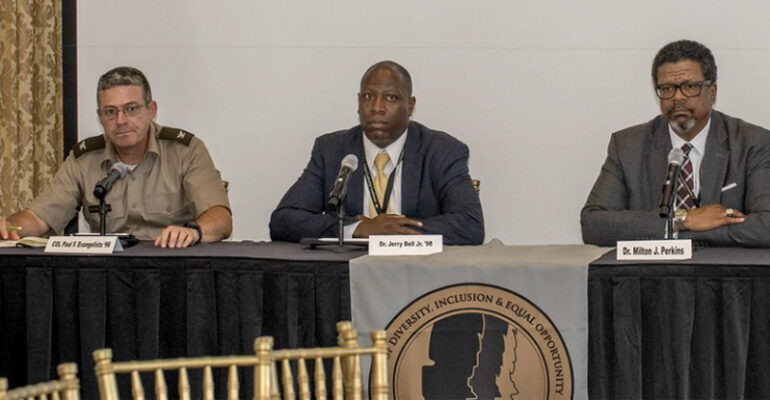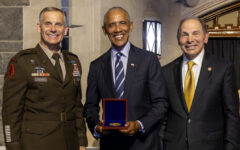West Point Data Chief Publicly Admits There is No Objective Evidence for Military DEI
6 October 2023 2024-01-24 15:48West Point Data Chief Publicly Admits There is No Objective Evidence for Military DEI

West Point Data Chief Publicly Admits There is No Objective Evidence for Military DEI
By John Hughes, MD, USMA ’96
LTG Steven Gilland’s West Point hosted the 20th annual Diversity, Equity, and Inclusion (DEI) Conference at West Point, NY, 30-31 August 2023.
The audience of nearly 400 was composed of cadets from West Point, United States Air Force Academy, and US Coast Guard Academy, officers from the US Army, US Air Force, USMC, US Space Force, and Canadian military, former NASA officials, staff and faculty at universities, and the lay public.
The conference included panels and lectures that discussed different facets of DEI.
One of the panels was called “Measuring DEI Success.” The moderator was Dr Russell Stevenson, the Deputy Director of West Point’s Academic Research Center.
Dr Stevenson asked the panel of experts the following question regarding the theme of data on military DEI: “How do we know the success when we see it or hear it or otherwise?”
COL Paul Evangelista, the USMA Chief Data Officer, candidly replied:
“First off, I’d just like to say I’m very humbled and honored to be sitting before you today and discussing this topic. I want to make it very clear that I don’t have the answer. I love data. I love getting to a finite solution, and I wish I had one for you. But I don’t. I just I want to start with that.”
COL Evangelista continued:
“So, I love data because I love exposing truth. And that’s one of the themes that I want to just kind of drive home a little bit. And I think that’s the most exciting part about my job… So, as I thought about this, the theme of this presentation today, measuring success, you know, I was scratching my head and thinking what, you know, I don’t have an answer. Just don’t.”
He was not alone in his admission that there is no objective data that shows that DEI makes the military more effective.
On 19 July 2023, at the Congressional Subcommittee Hearings on “Admission, Curriculum, and Diversity of Thought at the Service Academies,” Congressman Mike Waltz asked the USNA Superintendent, VADM Sean Buck, the following question:
“Admiral Buck, do you have any empirical evidence? Do you have any data, for example, that shows that a submarine crew is more combat ready or effective because of the diversity mix, because of the different mix of skin color?”
VADM Buck was shielded from answering by the time expiring. While he never answered “no,” he did not attempt to refute Waltz’ insinuation and did not answer the question later in the testimony or in public afterwards.
Dr Milton Perkins, another DEI Conference panel member, chimed in stating, “So, there’s proof out there. Does DEI work? Look it up. Absolutely. When you welcome me and make me feel good based on who I am, my performance goes up.”
Dr Perkins, a professional DEI influencer who is well paid on his Kings and Queens of DEI tour, provided no evidence directly linking the ‘happiness’ of service members to unit performance.
It seems the panel was recommending readiness and capability data for military combat units to be based on happiness surveys for soldiers, sailors, airmen, and marines.
At another lecture, Dr Aurelia Williams, Senior Vice Provost for Academic and Faculty Affairs at Norfolk State University commented, “And we all know that diversity, it has been documented ad nauseum on how diversity improves innovation in all areas.”
She provided no specifics on the “ad nauseum” she was referring to that directly showed DEI’s effects on combat units.
Later in that lecture, Dr Eric Moore, SES, Deputy to the Commanding General, U.S. Army Futures Command, Combat Capabilities Development Command was asked to also provide objective data to show DEI’s effectiveness in military units. He said, “it’s a different question that I’m not prepared to talk about today.”
Even Futures Command, whose self-stated purpose is to “transform the Army to ensure war-winning future readiness” could not provide an answer to justify the expense and time devoted to military DEI.
After the final lecture, a USAFA cadet approached the author and stated that she had objective data that showed DEI’s impact on military readiness and effectiveness in combat. She did not reply to emails to provide the research data she claimed to have to support DEI in the military.
Dr Stevenson said later in the DEI lecture on Measuring DEI Success, “Superintendent Steven Gilland recently observed that West Point should be the place, quote, “where America should look to see what right looks like when it comes to measuring success.”
With West Point’s own data officer stating that USMA has no data to objectively measure DEI’s success in the military, it is unclear what proof beyond empty rhetoric and ideology that Americans should be looking to LTG Gilland and West Point to provide.
While morale for military units is important, there is no data to directly correlate high DEI individual happiness self-report surveys with combat effectiveness and victory in war.
After failing to win a major war since World War II and no serious introspection into the reasons for losing Afghanistan, the DoD’s oversized interest in tribalism and servicemember happiness scores hints that the US military’s losing streak will likely not end anytime soon.
–
John Hughes, MD, (www.americandoctor.org) is a writer on medical and military matters. He is a 1996 West Point graduate, veteran of Haiti/Iraq/Afghanistan, and is a practicing Emergency Physician. He is a contributor to CDMedia and Armed Forces Press, has been featured in Real Clear Defense, Washington Examiner, and American Thinker, and has been a medical expert for Epoch Times. He is a leader in the MacArthur Society of West Point Graduates and a member of STARRS.US.
This article is the opinion of the author and does not represent the stance of any organizations or corporations.


















